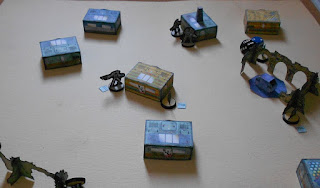Back in the first year of this blog, I wrote a little about how miniature skirmish games could be played solo. It was mostly a way to organize my thoughts on the subject, as I learned about new games and discovered other blogs discussing this.
These days I started thinking about it again -- maybe because the year is drawing to a close and thus my mind is sorting all the messy ideas floating around. So here is a slightly different take on that discussion: not limited to skirmish games and not trying to outline all possibilities. Instead, what follows is a presentation of how I have been playing solo miniature games.
Procedural narrative or "roll the dice and interpret the result"
Many of my solo games (most of them?) consist in a scenario with set objectives for the forces and rules to generate unexpected events (for instance 5150 Urban Renewal.) The fun lies in having this randomness add elements to the initial situation, and the narrative takes precedence over tactics. This category also includes games with limited tactical choices but strong narrative generators (for instance, Red Sun Black Moon.)
Scenario exploration or "play both sides of a weird setup"
Some of my games involve uneven or strange forces, or an atypical board setup. In these situations, I play both sides to the best of my ability, possibly with some random generator to add uncertainty. This is the case for most of my games of Song of Blades and Heroes, because it allows the creation of varied warbands. My recent Battle for Zorpel campaign using Five Core also falls in this category.
Automated opposition or "look up table X for the answer"
Some of my games are actually played against an artificial opponent, trying to use tactics to win the battle, usually with odds stacked against my forces. These mainly include the military-themed games from Two Hour Wargames, although the A.I. for X-Wing also works well.
What about force disposition systems (as found in USE ME and Five Core, for instance)? I have found in my games that they are useful to keep the enemy force's decisions consistent, However, I still have to make enough decisions for both sides that the games end up in either of the first two categories.
The same goes for card-driven activation, random activation rolls, random event tables and other similar mechanics: they add welcome uncertainty but in the end, decisions still must be made for both sides, such that the fun must (in my experience) lie in narrative or "what if" scenarios.
That is not to say there is anything wrong with playing with a focus on narrative, and I think this works well for the battle reports. However, it is something to keep in mind when I am planning my future campaigns.



4 comments:
Makes sense to me. I always read your reports (even when it's a period or genre I'm not particularly interested in, it's still good to see how others play solo games), but don't always comment. Keep up the good fun! And happy holidays!
Hello Fitz-Badger! Thanks for the comment and happy holidays for you too!
Nice analysis and rundown of factors.
Love seeing these "meta" articles.
Thanks for the comment!
Post a Comment